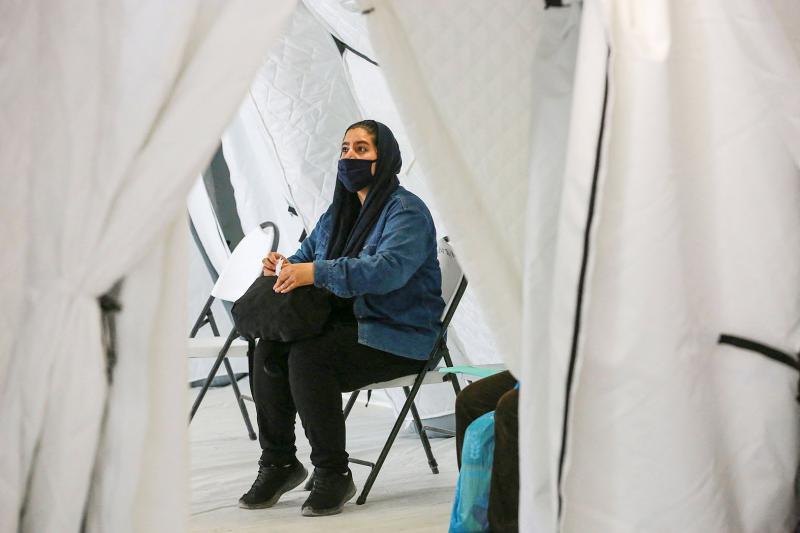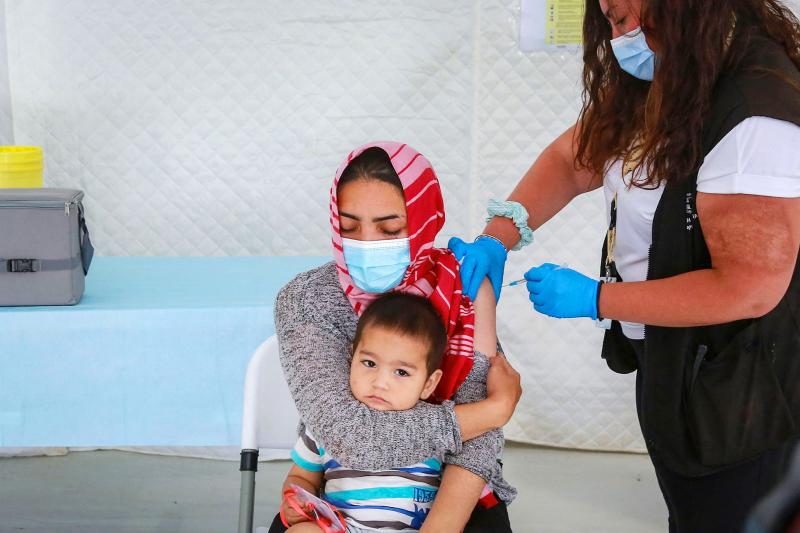Vaccinations against COVID-19 began in the migrant camp on the Greek island of Lesbos on Thursday, with authorities hoping to overcome widespread vaccine hesitancy among the asylum seekers.
“Some people are scared of getting vaccinated — they’re against it and have not put their names down,” Congolese asylum seeker Neihnman, 36, said.
The temporary camp is currently hosting some 6,000 migrants, part of a huge wave of arrivals since 2015 of people fleeing war and poverty in the Middle East, South Asia and Africa.

Photo: AFP
People were being welcomed into a large white vaccination tent in groups of five as the camp’s inoculation rollout got under way.
“It only lasts 20 seconds. Don’t worry, complications are very rare,” a doctor could be heard saying in a bid to reassure the vaccine recipients.
Medics checked the asylum seekers’ medical histories and informed them of possible side effects before administering doses of the Johnson & Johnson COVID-19 shot.

Photo: AFP
“We hope that the pace will increase in the coming days,” said camp director Nikos Babakos.
Barely 50 people had signed up to receive the jab so far, warned health official Anastasios Chatzis.
Greek asylum chief Manos Logothetis told the ANA news agency COVID Wednesday that across the refugee camps on the islands of Lesbos, Samos and Chios, “only 15 percent of asylum seekers have for the moment shown an interest in getting vaccinated.”
‘WE WILL SUCCEED’
But “if one estimates that 30 percent of this population are aged under 18 and another 30 percent have already been ill, the road towards immunity for the asylum seekers is a short one,” he said. “We will succeed.”
The migration ministry said the rollout would be expanded across all Greek camps next week. Neihnman said he wanted to get vaccinated in the hope that it might eventually allow him to leave the Lesbos site more easily.
“The measures for getting out of the camp are strict — we have to do rapid (antigen) tests each time,” he said.
Migrants’ freedom to leave the camps has been heavily curtailed during the pandemic as part of coronavirus restrictions — a measure roundly condemned by NGOs. While the wider Greek population have benefited from relaxations of lockdown restrictions at various points during the crisis, this has not been the case in the camps. At the height of the migration crisis in 2015, Lesbos served as the gateway to the EU for hundreds of thousands of people setting sail from nearby Turkey, hoping for a better life in Europe. Restrictions on transits to the Greek mainland left many refugees stranded in Lesbos where they were crammed into a camp named Moria, which swiftly became Europe’s largest camp and a byword for squalor.
The camp burned down last September, piling a further trauma on survivors who have now been moved to the makeshift tent camp. The UN refugee agency estimates that some 9,400 people are currently living in camps across the Aegean islands, out of a total 80,000 asylum seekers in Greece.

Most heroes are remembered for the battles they fought. Taiwan’s Black Bat Squadron is remembered for flying into Chinese airspace 838 times between 1953 and 1967, and for the 148 men whose sacrifice bought the intelligence that kept Taiwan secure. Two-thirds of the squadron died carrying out missions most people wouldn’t learn about for another 40 years. The squadron lost 15 aircraft and 148 crew members over those 14 years, making it the deadliest unit in Taiwan’s military history by casualty rate. They flew at night, often at low altitudes, straight into some of the most heavily defended airspace in Asia.

Beijing’s ironic, abusive tantrums aimed at Japan since Japanese Prime Minister Sanae Takaichi publicly stated that a Taiwan contingency would be an existential crisis for Japan, have revealed for all the world to see that the People’s Republic of China (PRC) lusts after Okinawa. We all owe Takaichi a debt of thanks for getting the PRC to make that public. The PRC and its netizens, taking their cue from the Chinese Communist Party (CCP), are presenting Okinawa by mirroring the claims about Taiwan. Official PRC propaganda organs began to wax lyrical about Okinawa’s “unsettled status” beginning last month. A Global

Taiwan’s democracy is at risk. Be very alarmed. This is not a drill. The current constitutional crisis progressed slowly, then suddenly. Political tensions, partisan hostility and emotions are all running high right when cool heads and calm negotiation are most needed. Oxford defines brinkmanship as: “The art or practice of pursuing a dangerous policy to the limits of safety before stopping, especially in politics.” It says the term comes from a quote from a 1956 Cold War interview with then-American Secretary of State John Foster Dulles, when he said: ‘The ability to get to the verge without getting into the war is

Like much in the world today, theater has experienced major disruptions over the six years since COVID-19. The pandemic, the war in Ukraine and social media have created a new normal of geopolitical and information uncertainty, and the performing arts are not immune to these effects. “Ten years ago people wanted to come to the theater to engage with important issues, but now the Internet allows them to engage with those issues powerfully and immediately,” said Faith Tan, programming director of the Esplanade in Singapore, speaking last week in Japan. “One reaction to unpredictability has been a renewed emphasis on